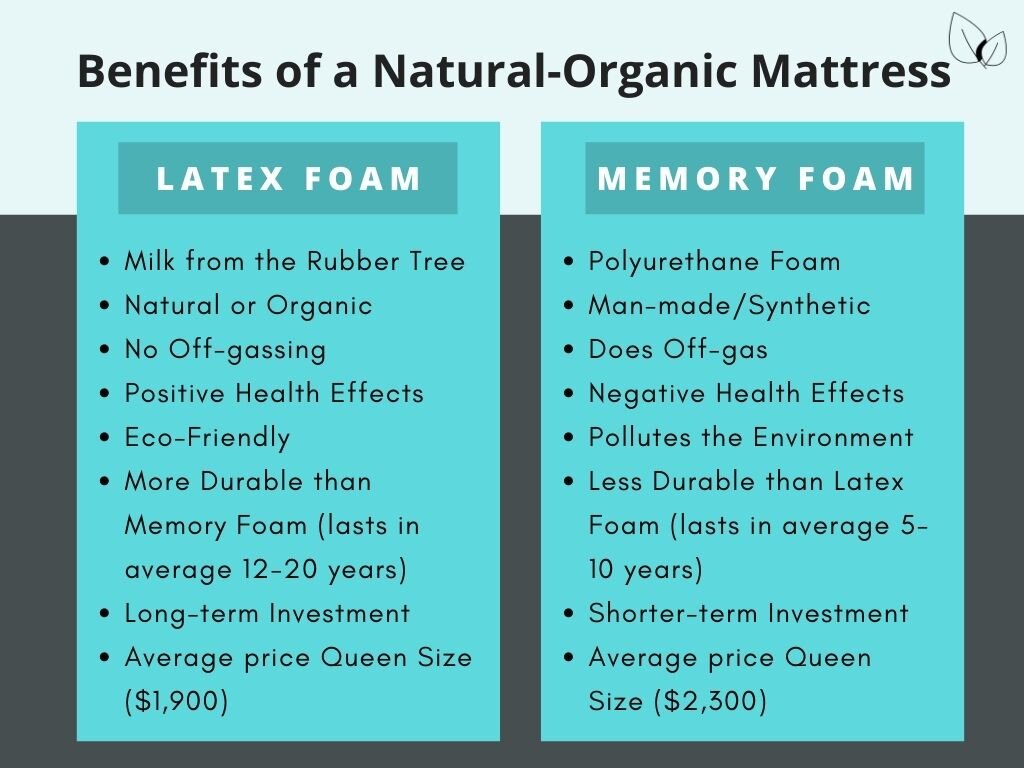Are you looking for a healthier, more natural sleep? Then you may want to consider investing in an organic mattress. An organic mattress is made from all-natural materials that are free of potentially toxic chemicals and synthetic materials. By sleeping on an organic mattress, you can reduce your exposure to potentially harmful substances and enjoy a more comfortable sleep. In this article, we’ll explore the benefits of sleeping on an organic mattress and discuss what to look for when shopping for one.
Definition of an Organic Mattress

An organic mattress is a type of mattress made with natural materials, such as organic cotton, wool, and natural latex. It is free of synthetic chemicals and manufactured without the use of synthetics, such as polyurethane foam, formaldehyde, and flame retardants.
Materials Used
Organic mattresses typically use materials such as organic cotton, wool, and natural latex. Organic cotton is grown without the use of synthetic chemicals, making it a healthier choice than conventional cotton. Wool is an all-natural fiber that is naturally flame-retardant and provides insulation and breathability. Natural latex is an all-natural material derived from the sap of rubber trees and is naturally hypoallergenic and dust-mite resistant.
Certifications
Organic mattresses are typically certified by organizations such as Global Organic Textile Standard (GOTS) and Global Organic Latex Standard (GOLS). GOTS certifies that mattresses are made with at least 95% organic materials, while GOLS certifies that the latex used is made with a minimum of 95% organic materials. Additionally, some organic mattresses are certified by Greenguard, which tests products for low levels of chemicals and other volatile organic compounds (VOCs).
Benefits of an Organic Mattress

Improved Health
Organic mattresses are made of natural materials and are free of toxins and chemicals that can harm your health. The use of organic materials helps reduce the risk of allergies, asthma, and other health issues. Organic mattresses also provide superior comfort and support, allowing for a deeper and more restful sleep.
Eco-Friendly
Organic mattresses are a great choice for those looking to reduce their environmental footprint. The materials used in organic mattresses are sustainable and renewable, and the manufacturing process is free of toxins and chemicals. Organic mattresses are also biodegradable, meaning they can be broken down and recycled.
Durability
Organic mattresses are built to last. They are made with high-quality materials that are designed to resist wear and tear. Organic mattresses are also hypoallergenic and dust mite resistant, ensuring they will remain in great condition for years to come.
Disadvantages of an Organic Mattress

Organic mattresses are often more expensive than conventional mattresses and may require a larger initial investment. Additionally, the lifespan of organic mattresses is often shorter due to their natural composition, although they can be repaired or replaced. Organic mattresses may also be harder to find than conventional mattresses, as they are not as widely available in stores. Finally, organic mattresses may be heavier than conventional mattresses due to the materials used.
Considerations for Purchasing an Organic Mattress

Price
Organic mattresses can be more expensive than traditional mattresses, so it’s important to factor in the price when making a purchase. Look for products that are certified organic and offer warranties or guarantees.
Quality
Organic mattresses are made with natural materials, such as wool, cotton, and latex. These materials are long lasting and provide a comfortable sleeping surface. Make sure to research the manufacturer and read reviews to ensure you’re getting the highest quality product.
Firmness
Organic mattresses come in a variety of firmness levels to suit different sleepers. It’s important to find the right firmness level to ensure a comfortable sleep.
Size
Organic mattresses come in a variety of sizes, from twin to king size. Be sure to measure your space before buying to ensure you get the right size for your bed.
Care and Maintenance of an Organic Mattress

- Rotate and Flip: An organic mattress should be rotated and flipped every three to four months to ensure even wear and tear.
- Clean Regularly: Organic mattresses should be vacuumed or spot-cleaned with a mild detergent and warm water.
- Protect: A mattress protector is essential for keeping your mattress clean and free from dirt and dust.
- Keep it Fresh: Adding a fabric refresher every few months can help keep your mattress fresh and free from odours.
- Air it Out: It is important to air out your mattress periodically to prevent moisture and odour build-up.
- Repair: If an organic mattress develops a tear, it should be repaired promptly to prevent further damage.
Alternatives to an Organic Mattress
Memory Foam: Memory foam mattresses are made from polyurethane foam and are known for their contouring and pressure-relieving qualities. They are made with synthetic materials and chemicals, so they are not organic and not as environmentally friendly as an organic mattress.
Innersprings: Innerspring mattresses are made with metal coils and are usually topped with a layer of foam or synthetic fibers. These mattresses do not offer the same comfort and support as an organic mattress, and they also contain synthetic materials that are not as eco-friendly.
Latex: Latex mattresses are made with synthetic or natural latex, and they are very comfortable and supportive. However, they are not considered organic, as the material is processed with chemicals and synthetic materials.
Hybrid: Hybrid mattresses are made with a combination of materials, including innersprings, memory foam, and latex. They offer the best of both worlds, but they are not organic and contain some synthetic materials.
Airbeds: Airbeds are made with air chambers and are adjustable for different levels of firmness. They are comfortable and supportive, but they are not considered organic, as they do not use natural materials.
Frequently Asked Questions
What are the materials used to make an organic mattress?
An organic mattress is made with natural materials like wool, cotton, and latex that are free of harsh chemicals, such as formaldehyde, pesticides, and flame retardants. Here are some of the materials used to make an organic mattress:
- Organic Cotton: Organic cotton is grown without the use of synthetic pesticides, herbicides, or chemical fertilizers. It is naturally hypoallergenic and breathable, making it a great material for an organic mattress.
- Organic Wool: Organic wool is an excellent choice for an organic mattress because it is naturally resistant to dust mites and other allergens. It is also fire-resistant, moisture-wicking, and breathable.
- Organic Latex: Latex is a natural rubber found in the sap of rubber trees. Organic latex is free of VOCs, synthetic chemicals, and other toxins. It is also hypoallergenic and breathable, making it a great material for an organic mattress.
Organic mattresses also often use other natural materials like bamboo, coconut coir, and horsehair to add support and cushioning.
Are Organic Mattresses More Expensive than Traditional Mattresses?
- Price: Organic mattresses are typically more expensive than traditional mattresses, but the price difference is often offset by the health and environmental benefits.
- Materials: Organic mattresses may cost more because they are typically made with higher-quality materials such as organic cotton, wool, and latex, which are more expensive than synthetic materials used in traditional mattresses.
- Durability: The materials used in organic mattresses are typically more durable than those used in traditional mattresses and will last longer, reducing the need for frequent replacements.
- Certification: Organic mattresses are often certified by third-party organizations, and this certification process can add to the cost. The certification ensures that the mattress is made with safe and sustainable materials.
Organic mattresses may cost more initially, but many people find that the cost is worth it for the health and environmental benefits, as well as the durability of the mattress.
How do I know if an organic mattress is a good option for me?
Organic mattresses are an excellent option for those seeking a more natural and eco-friendly sleeping experience. Organic mattresses are made with natural and organic materials such as organic cotton, wool, and latex. They are free of harmful chemicals, dyes, and synthetic materials. Organic mattresses also provide a healthier sleeping environment by being dust mite, mold and mildew resistant. If you are looking for a mattress that is comfortable, eco-friendly and provides a healthier sleeping environment, an organic mattress is a great option for you.
Is an Organic Mattress More Comfortable than a Traditional Mattress?
Organic mattresses are made without synthetic materials, such as polyurethane foam, and use natural, breathable materials like latex, wool, and cotton. This construction makes organic mattresses more breathable and temperature neutral, allowing you to sleep cooler and more comfortably. Additionally, organic mattresses are often made with fewer layers, which can make them feel more supportive. Ultimately, whether an organic mattress is more comfortable than a traditional mattress is subjective, as comfort is largely dependent on individual sleep preferences.
Are Organic Mattresses More Durable Than Traditional Mattresses?
Yes, organic mattresses are more durable than traditional mattresses. Organic mattresses contain natural, breathable materials that are designed to last for years. A few of the benefits of an organic mattress include:
- The natural materials used in organic mattresses are highly durable and can stand up to wear and tear better than traditional mattresses.
- Organic mattresses are often made with organic wool, which is naturally fire resistant, helping to reduce the chance of a mattress catching fire.
- Organic mattresses are often made with multiple layers of different materials, including organic latex, which provides excellent support and contours to the body.
- Organic mattresses are often constructed with steel coil springs or pocket coils, both of which are highly durable and provide superior support.
- Organic mattresses are often treated with natural oils or waxes that help to protect the material from dust mites, allergens, and bacteria.
Organic mattresses may also be more expensive than traditional mattresses, but the extra cost is well worth it for the superior durability and health benefits that organic mattresses provide.
Conclusion
Organic mattresses are a great choice for those looking for a healthier and more eco-friendly sleep. With natural materials, no chemical off-gassing, and a longer life-span, organic mattresses provide a more sustainable option for those looking for a great night’s sleep. The benefits of an organic mattress are undeniable, and choosing one can be a great decision for the health of your home and family.






